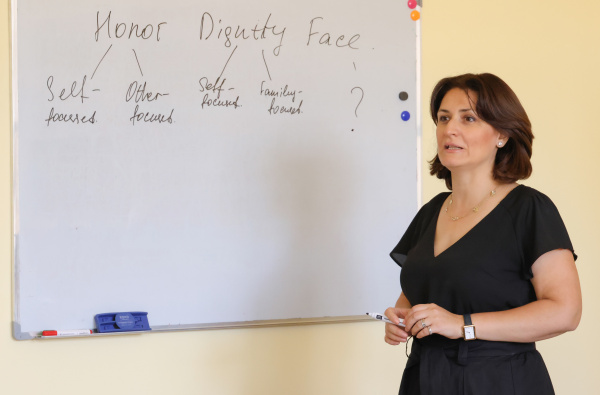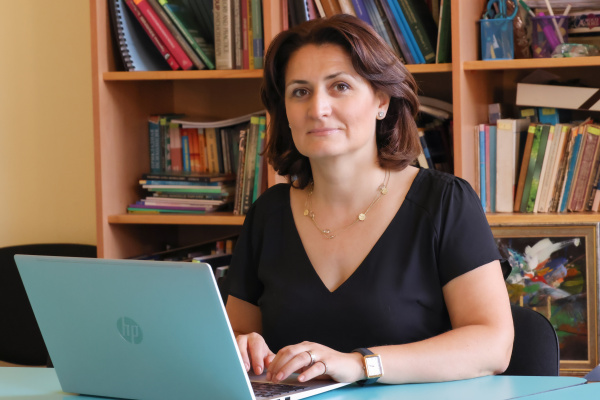September 30, 2024 | 13:17
Education
Research
YSU psychologists’ scientific research paves the way for expanding international cooperation
Associate Professor, PhD Narine Khachatryan, Head of the Chair of Personality Psychology at Yerevan State University, and her research team studied the valuation of individuals in society and the regulation of social relations in different environments. They presented their findings from this long-term study at the 21st European Conference on Personality (ECP21) held at Humboldt University in Berlin.

In the Interview with us, Narine Khachatryan talked about the relevance and significance of the research, as well as the topic presented at the conference.
- What was the scope of your research? What makes it stand out, and what is new?

- Our study summarizes the outcomes of four different research projects conducted through a step-by-step approach. We focus on a concept related to value orientations: the cultures of "honour," "dignity," and "not losing face" (the importance of maintaining one’s social role in society). This approach, unlike others that examine an individual's value orientations, views internalized values not as desired end results of behavior, but as undesirable behaviors accepted by society and individuals alike.
According to this approach, the culture of dignity is characteristic of countries that emphasize the supreme value of the individual and the importance of personal principles. In contrast, honour as a cultural norm emerged in the absence of the force of law, where maintaining one’s honour in the eyes of others was crucial for individuals.
The first stages of our study were psychometric in nature, and the analysis revealed that dignity did not emerge as a "pure" factor; instead, it appeared to be "bifurcated" into self-focused and other-focused components. In Western countries, dignity often manifests as a selfish, self-centered norm, whereas in our country, the relational aspect is also significant. In other words, my dignity is tied to how I act for the benefit of my relatives. This perspective is particularly evident in Armenian society, where dignity as a social norm is understood as "I act for the benefit of another (relative, friend, Armenian)."
I also presented the research results at the 21st European Conference on Personality (ECP21).
- What type of feedback did you receive regarding your presentation at the conference?
- The conference was organized by the European Association of Personality Psychology. For the past four years, I and the researchers from the Social Environment Research Laboratory have been members of this organization, participating in biannual conferences that feature various formats, including seminars, lectures, symposia, and oral presentations. At this year's conference, I presented our research in the section titled "The Cultural Perspective on Individual Differences". During my presentation, the president of the European Association for Personality Psychology remarked that we examined value orientations from a crucial perspective. He noted that countries with cultures similar to ours are neither strictly collectivist nor individualistic, and in the context of social beliefs, they can become an interesting field for study. I should mention that in our study we applied a complex methodology, incorporating both quantitative and qualitative methods. We performed qualitative analyses using open-ended questions. We conducted surveys asking one group of people what dignity means to them and what they consider to be questions of dignity. Another group was asked about their understanding of honour and what they see as questions of honour. Interestingly, the responses revealed a semantic connection between dignity and honour; many situations perceived as matters of dignity were also seen as matters of honour. In Armenian society, these two social norms appear to be closely intertwined. Additionally, it's noteworthy that in cross-cultural comparisons, Armenian society is classified as having a "culture of honour," which adds another layer of significance to our findings.

- What is the role and significance of such scientific events?
- I have participated in similar conferences since 2008, which have been invaluable for observing the evolution of personality psychology. Understanding how the field is developing, what new research and analyses are being conducted, and what methodologies or tools are being introduced is crucial. The pace of development is rapid, with new approaches emerging in a short time. A noticeable trend is the focus on personality development, not only from an age perspective but also in relation to significant life events. Researchers are increasingly examining how both positive and negative experiences influence personality change, development, and personal growth. Additionally, how people narrate their stories and perceive themselves within those narratives is an interesting factor.
It is noteworthy that the conference featured discussions on a variety of topics. Several symposia on artificial intelligence were particularly interesting to me, especially the discussions on how to use AI for text analysis.
Participating in such scientific events allows us to forge new partnerships and collaborate with international researchers, thereby strengthening global cooperation.
It should be noted that since the beginning of their studies on value orientations, the representatives of the research team, in cooperation with foreign partners, have published three scientific articles in high-impact journals.
We have referred to the studies conducted by the research team of the Research Laboratory of Personality and Social Environment in another article, which can be found here.

